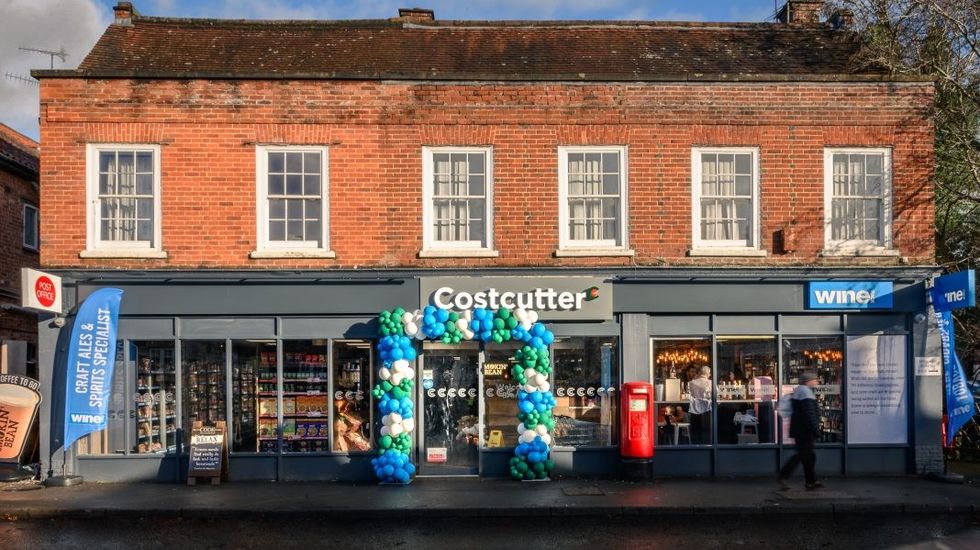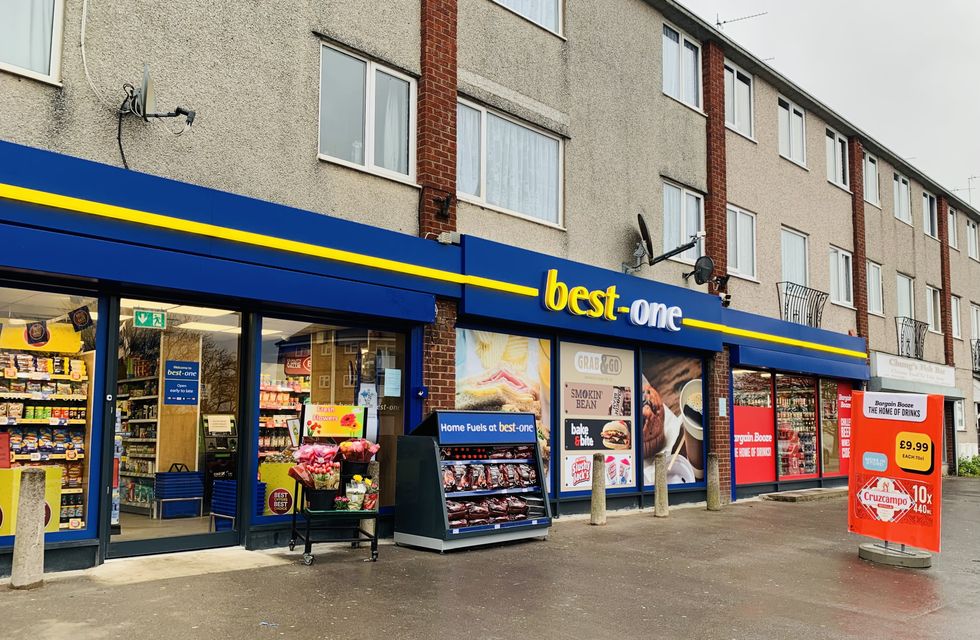In today’s fast-changing retail landscape, Bestway Wholesale is known for making bold moves when necessary. But lately, it’s store arm, Bestway Retail, has been buzzing with fresh ideas, capturing the attention of both the industry and consumers alike.
From pioneering hybrid new store models to spearheading customer-centric strategies, strengthening retailer relation and expanding own brand line, Bestway Retail has been cementing its position as a dynamic player for some time now.
The biggest buzz right now is around their innovative approach of “store within a store”, also known as dual store or hybrid store concept. Introducing back-to-back permutations and combinations of its different symbol groups (Costcutter, Best-One, Bargain Booze, Wine Rack, Select Convenience and Central Convenience) in a new dual store format, Bestway Retail is definitely on to something fresh and intriguing.
Asian Trader got in touch with Bestway Retail Director Jamie Davison, who is said to be the driving force behind Bestway’s recent redefinition of convenience stores.
Davison explained, “Our dual supply hybrid store concept focuses on the different customer demographics and having the right offer and proposition that meets the needs of local customers in that catchment area.
“We believe that our new concept stores define the future of convenience. This innovative and pioneering concept brings together the strength of the Costcutter or Best-one’ convenience offer with the leading beers, wines, and spirits lines available from Bargain Booze or Wine Rack to make a fantastic proposition for both retailers and consumers alike.
“We are proud of our hybrid concept that allows retailers to not only compete, but to thrive and take on all competitors within the convenience market with confidence.”
Daring Duals
Introduced by former Bestway retail director Mike Hollis in early 2022, the inspiration behind this model stems from the thought that no two stores are completely alike.
The first Costcutter-Bargain Booze hybrid store was adopted by Costcutter retailer Peter Patel at his Meopham store in Kent, showcasing a 420 sq ft Bargain Booze section inside his 1,900 sq ft store. The store reported a spike of “166 per cent” in alcohol sales after the refit and rebranding.
Another such dual-branded store in Bolton has also been seeing encouraging numbers since it adopted Costcutter-Bargain Booze model. With two prominent brands displayed outside the store, retailer Kersheaup Vagadia’s store has been seeing a “significant increase” both in footfall and in average basket spend.
What makes this hybrid model so compelling? In an era where personalisation is key, Bestway’s hybrid stores seem to hit the nail with their adaptability and flexibility.
The “marriage of the two brands” means the hybrid stores have an exciting and market leading alcohol offer to complement the leading grocery proposition, Davison said, adding that some dual stores have been boosting store sales by a whopping “220 per cent”.
Under the umbrella of “store within a store” model, Bestway Retail has so far introduced Costcutter-Bargain Booze proposition and Costcutter-Wine Rack model.
Wine Rack hybrid is for a “more premium demographic with its range of wines and Champagnes” while Bargain Booze one targets the “mass market looking for value offerings”, Davison explained.
The first Costcutter Wine Rack hybrid store opened in Guildford in late 2023, a concept that is set to be rolled out wider across the Southwest.
Calling them “a key part of Bestway Retail’s winning formula”, Davison stated that the hybrid stores provide shoppers with “wide fresh and chilled offering, Own Label (Coop, Best-in), wide range of branded groceries, a full suite of Food-to-Go options, exceptional usage of locally sourced Direct to Store Supply Partnerships (over 300), specialist BWS offer,£5 million investment in marketing packages and significant investment in social media channels”.
Davison continued, “Our dual supply hybrid stores were executed by drawing off the extensive knowledge and expertise of colleagues and departments across Bestway businesses, working collaboratively with partners to ensure the store-within-a-store concept delivered the right proposition for the store demographic.”
Bestway Retail has so far completed 10 of the dual-branded conversions. The wholesale giant said it was planning to expand the concept and supply into areas of the UK within which Bargain Booze had not historically operated.
Meanwhile, Davison stated that Bestway Retail is aiming to have “100 such hybrid cum dual stores by the end of 2024”.Bestway Retail’s plans don’t stop there. The group has also struck a long-term partnership with SimplyFresh, allowing SimplyFresh retailers to open dual-fascia stores with Bargain Booze and Wine Rack brands.
With almost 30 years of experience in retail, Davison is clearly a veteran and a seasoned retail expert who knows the business inside out- definitely a perfect person to lead a bold initiative like this.
Starting his career with his own store, Davison joined Costcutter in 1999 where he quickly climbed the ranks to become Business Development Director of New Business. He came to Bestway along with Costcutter acquisition, joining as Business Development Director, a position he has held since 2021.
In current role of Retail Director which he took last year, Davison has overall accountability for the new business and store development teams along with overall responsibility for the support and development of the Best-one, Costcutter, Bargain Booze, Wine Rack brands, along with relationships held with symbol retailers.
Davison told Asian Trader, “My role is focused on engaging with our customers and ensuring my team are supporting and driving our customers plans to grow’. I am ensuring that we continue to develop our retailer engagement and the propositions and services that we offer.”
For a company supporting over 3,000 retail outlets under its core brands, such a commitment to growth is certainly no small task.
Meanwhile, Bestway Retail’s renewed focus on its symbol retailers, driven by Davison, is now starting to show results. The numbers are speaking for themselves.
Davison said, “Average weekly purchasing figures from new hybrid group of stores is nearly double the average of a non-hybrid Costcutter, Bargain Booze or Wine Rack retailer. Rebate being paid back to a hybrid retailer by Bestway is +40 per cent vs the average paid to non-hybrid Costcutter which demonstrates loyalty.”
The other encouraging figures reported at dual stores are “3 per cent margin growth as well as margin rate improvement, 40 per cent improvement in footfall, 48 per cent increase in weekly sales and +11.7 per cent average basket spend”, Davison informed.
Bestway’s focus isn’t limited to its hybrid stores. The company has also undertaken a major facelift for its Best-One brand, refreshing the way these stores are presented, ensuring a vibrant and modern look and feel is carried out both internally and externally.
Davison said, “The main focus of this modernisation was to overhaul, focus on key promotions for low demographic areas and the introduction of an up weighted own label presence.”
The pilot of revamped Best-one, that opened near Bristol, boasts of “refreshed 3D-halo, back lit fascia and new vinyl’s that reflect what the store is selling”. The refreshed Best One model also has “stronger value message, promotion gondola, twice dump bins, floor stacks and dedicated own label range in “Best-in bay”.
“Customers love what we have done, and they are supporting us with their pounds,” Davison said.
Buzz has it that there is another hybrid model brewing, which could see a Bargain Booze store sited within a Best-one, or vice-versa, depending on whether the store in question is grocery or alcohol-driven. The concept would likely replace the current Select Convenience format.
Retailer relations
To strengthen its relationship with retailers, Bestway has been developing retailer engagement programmes for its 3000 retailer outlets.
Davison told Asian Trader, “Relationships are at the heart of all we do, and we want to continue to support that. We have introduced our retailer forums across all our brands; we are holding retailer regional meetings.”
Bestway’s retailer showcase held in May was the “biggest and the most successful” the group has seen to date, with the attendance of more than 500 retailers.
He pointed out, “We also make sure to engage with suppliers and develop partnerships and networking opportunities for our colleagues. Throughout the year we plug in opportunities for social events as well to strengthen the relationship building with retailers and suppliers. Every end of the year we come together in November to celebrate our colleagues, our retailers and our valued supplier partners as well at our Bestway Awards.”
Davison also credited the field teams, highlighting their role in constantly supporting retailers.
He said, “Our field team helps retailers understand their key catchment area, the trade zone that they operate in, to be able to compete in their specific location and bring the relevant ranges, fulfill the missions of the various shopper personas and bring their shopper a key value offer and maximize the opportunities out there.”
While Bestway is undoubtedly focused on growth, it hasn’t lost sight of the challenges facing the convenience sector.
Davison informed, “We have developed a very strong own label proposition to bring value to shoppers impacted by the cost-of-living crisis. Having three principles in mind – margin, value and quality – the range features almost 200 lines.”
Retail crime is another pressing issue.
He said, “We are working closely with our retailers and use our forums to ensure we listed to the issues and provide support with solutions. With Dawood Pervez (managing director at Bestway Wholesale) being a chairman of FWD, we also seek support from the rest of the industry as well where applicable.”
As the retail landscape continues to shift, Bestway Retail is also preparing for the impact of new legislative restrictions, such as the disposable vape ban and possible Deposit Return Scheme (DRS) regulations.
He said, “We acknowledge the importance of all these policies and respect them and are working with our customers to transition and mitigate any risks. For example, when it comes to the HFSS regulations, we have been developing our Good Food project for over two years now, with the objective to bring healthier options to our customers.”
Future is here
Davison’s extensive experience in convenience retail, combined with his deep understanding of the industry, gives him a unique perspective. His advice to independent retailers is simple yet profound that “one size or model does not fit all” and it is important to get to know the customers and adapt the propositions to tailor serving specific needs.
Looking ahead, Davison seems laser-focused to further develop dual-branded stores, ensuring “there's a perfect fit for everyone”.
He told Asian Trader, “Our focus is on creating dynamic, modern, and customer-centric spaces that cater to evolving shopper missions.
“We will tailor solutions to the unique needs of our retailers and optimise our Shopper First program to target key audience demographics to help pinpoint the right offers. Whether a bustling city centre outlet, community store or a cosy neighbourhood shop, we've got it covered.”
In many ways, Bestway Retail’s hybrid store model encapsulates the group’s as well as Davison’s philosophy- flexibility, agility, adaptability, personalisation and local relevance. As the retail landscape continues to evolve, it’s clear that Bestway is not just keeping pace but is ahead of the curve. The future, it seems, is already here.










